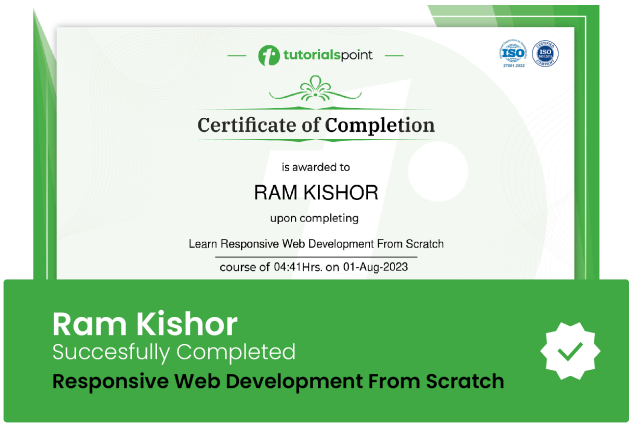Quantitative Aptitude - Cracking Aptitude Tests!
"Quantitative Aptitude: Building Mathematical Mastery from Basics to Advanced"

Lectures -75
Duration -6 hours

30-days Money-Back Guarantee
Get your team access to 10000+ top Tutorials Point courses anytime, anywhere.
Course Description
Join my course on Quantitative Aptitude - From Scratch to Advanced! Perfect for those preparing for placement tests, recruitment board exams, MBA/MCA entrance examinations, and higher studies entrance exams.
Experience an easy teaching methodology where we discuss concepts, formulas, and hints first, and then apply them to solve problems of varying difficulty levels: easy, medium, and hard.
Covering major topics such as Time and Work, Pipes and Cisterns, Time and Distance, Problems on Trains, Boats and Streams, Percentages, Theory of Sets, Profit and Loss, Alligation and Mixture, and Permutations and Combinations.
Each module includes 8-20 problem-solving exercises to ensure a thorough understanding and build confidence. The course caters to beginners, intermediates, and experts, with solutions provided for difficult problems.
Quantitative aptitude is essential for aptitude exams in India, testing not only quantitative skills but also logical and analytical abilities. Develop your problem-solving techniques and numerical handling skills through these questions.
Don't miss out! Join the course now, grab your pen and paper, and be prepared to take notes. See you there!
Goals
What will you learn in this course:
Building a strong foundation: The course aims to establish a solid understanding of fundamental mathematical concepts and operations, including arithmetic, fractions, decimals, percentages, and basic algebra. It focuses on strengthening the basics to ensure a strong mathematical foundation.
Enhancing problem-solving skills: The course aims to develop effective problem-solving techniques and strategies. Students learn various approaches to simplify, analyze, and solve quantitative problems efficiently. They gain the ability to apply mathematical concepts to real-life scenarios and tackle complex problems with confidence.
Developing critical thinking and analytical abilities: The course emphasizes the development of logical and analytical thinking skills. Students learn to interpret and analyze data presented in different formats, make deductions, identify patterns, and draw conclusions. They enhance their quantitative reasoning abilities and become adept at logical thinking.
Increasing speed and accuracy: Quantitative aptitude courses focus on improving speed and accuracy in calculations. Students practice mental math techniques, learn shortcut methods, and develop computational skills to solve problems quickly. They also learn time management strategies to perform well under time constraints, such as in aptitude tests or competitive exams.
Strengthening mathematical concepts: The course aims to deepen students' understanding of advanced mathematical topics, including geometry, trigonometry, algebraic equations, logarithms, and calculus. Students learn to apply these concepts in problem-solving and gain proficiency in handling more complex quantitative problems.
Boosting confidence and overcoming math anxiety: A significant goal of a quantitative aptitude course is to instill confidence in students when dealing with mathematical problems. By providing a supportive learning environment, clear explanations, and ample practice opportunities, the course helps students overcome math anxiety and build a positive attitude towards quantitative aptitude.
Preparing for aptitude tests and competitive exams: Many quantitative aptitude courses have the goal of preparing students for aptitude tests and competitive exams that assess mathematical abilities. The course covers topics and question types commonly encountered in such exams and equips students with the skills and strategies needed to excel.
Promoting lifelong learning: The course aims to cultivate a mindset of continuous learning and improvement in quantitative aptitude. Students develop a curiosity for exploring mathematical concepts, seek further challenges, and develop the skills to independently acquire and apply mathematical knowledge beyond the course.
Prerequisites
What are the prerequisites for this course?
- Nil. Interest and Involvement are needed.

Curriculum
Check out the detailed breakdown of what’s inside the course
Introduction
1 Lectures
-
Introduction to the course! 02:17 02:17
Time and Work
12 Lectures

Pipes and Cisterns
6 Lectures

Time and Distance
9 Lectures

Problems on Trains
9 Lectures

Boats and Streams
6 Lectures

Percentages, Theory of Sets
12 Lectures

Profit and Loss
7 Lectures

Mixture and Alligation
4 Lectures

Permutations and Combinations
9 Lectures

Instructor Details

Sujithkumar M A
eCourse Certificate
Use your certificate to make a career change or to advance in your current career.

Our students work
with the Best


































Related Video Courses
View MoreAnnual Membership
Become a valued member of Tutorials Point and enjoy unlimited access to our vast library of top-rated Video Courses
Subscribe now
Online Certifications
Master prominent technologies at full length and become a valued certified professional.
Explore Now


 Updated on May, 2024
Updated on May, 2024
 Language - English
Language - English